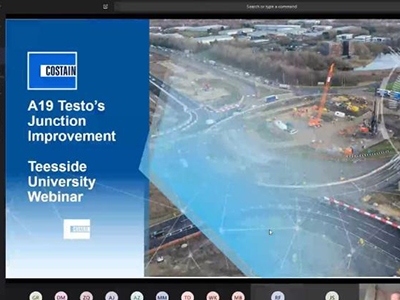Course overview
You develop skills in a range of disciplines in civil engineering to help you progress your career through employment, promotion or further study.
You could progress onto our BSc (Hons) Construction Management or BEng (Hons) Civil Engineering.
Course details
Course structure
Core modules
Civil Engineering Technology (HN)
Explore the role of professional civil engineers, focusing on their essential involvement in constructing and maintaining earthworks and substructures, as well as the key technologies they apply. You learn about earthwork activities, temporary and permanent dewatering procedures, substructure construction methods and techniques, and the common hazards, technical problems and solutions in modern civil engineering.
Geotechnics and Soil Mechanics (HN)
You are introduced to the importance of geological processes, and the properties of soils and rocks in civil engineering. You learn to analyse and evaluate modern geotechnical methods and apply these skills and knowledge to the initial design of infrastructure.
You apply the skills and knowledge that you developed in other modules of the course (and where possible experiences from work) within a major piece of work that reflects the type of performance expected of construction technologists.
You develop your ability to identify, define, plan, develop and execute a successful project by working through a clear process. You develop a project brief, outlining a problem that requires a solution, as well as a project specification, the specific requirements of which the final outcome must meet.
You research the problem, undertaking a feasibility study, and consider a range of potential solutions using critical analysis and evaluation techniques to test, select and contextualise your preferred solution. You also provide a work and time management plan, keeping a diary of all activities, reflecting on their process and their learning throughout the project.
Mathematics for Construction (HN)
This module develops your underpinning mathematical knowledge and techniques relevant to studies in construction and civil engineering. You are introduced to mathematical methods and statistical techniques in order to analyse and solve problems within a construction engineering context. It has been designed to enable you to develop your knowledge of algebra, trigonometry, calculus, statistics and probability, for the analysis and solution of realistic construction problems.
Principles of Structural Design (HN)
You study common types of structures used in engineering, assess the types of loads they must resist and develop the analytical skills you need to design structural components. Explore key areas including the basic concepts of force, stress and strain; material and section properties; analysis of frames, beams and columns; equilibrium conditions and statically determinacy; as well as beam bending moment, shear force, deflection and structural design.
You are introduced to scientific principles and gain foundational knowledge of the material properties essential for successfully completing the other core and specialist modules. Analyse, apply, investigate and evaluate scientific properties and the behaviour of materials in construction-related situations.
Surveying, Measuring and Setting Out (HN)
Develop your skills in surveying, a critical function throughout a construction project’s lifecycle – from initial data collection and control network setup, to construction positioning and post-build verification. Learn to use modern surveying equipment, perform setting out procedures, communicate results, and analyse errors and mitigation techniques commonly encountered in the field.
The Construction Environment (HN)
You explore the composition and impact of the construction industry on the environment and society. By examining the roles and relationships of individuals and organisations within the construction sector, you gain an overview of how the industry works both organisationally and personally to improve the built environment, minimise environmental impact and maintain economic sustainability and growth.
Modules offered may vary.
How you learn
The course is delivered using a combination of practical sessions, lectures and tutorials. You are required to complement your learning with self-study.
How you are assessed
Assessment is by written assignments, case studies, projects and tests which are planned throughout the year.
Our Disability Services team provide an inclusive and empowering learning environment and have specialist staff to support disabled students access any additional tailored resources needed. If you have a specific learning difficulty, mental health condition, autism, sensory impairment, chronic health condition or any other disability please contact a Disability Services as early as possible.
Find out more about our disability services
Find out more about financial support
Find out more about our course related costs
Entry requirements
Entry requirements
64 points, including maths, from any combination of acceptable Level 3 qualifications including A-level, BTEC, Access to HE Diploma, Scottish and Irish Highers, T-Level, or the International Baccalaureate. We accept T-Levels which include Level 3 maths and cover topics in calculus.
Find out how many points your qualifications are worth using the UCAS tariff calculator.
We are not accepting applications from international students requiring a Student Visa for this course.
For general information please see our overview of entry requirements.
International applicants can find out what qualifications they need by visiting Your Country.
You can gain considerable knowledge from work, volunteering and life. Under recognition of prior learning (RPL) you may be awarded credit for this which can be credited towards the course you want to study.
Find out more about RPL
Employability
Career opportunities
You can apply your knowledge and skills in a range of roles in civil engineering management, structural design, environmental engineering, water engineering, surveying, highways and transportation.
Information for international applicants
Qualifications
International applicants - find out what qualifications you need by selecting your country below.
Select your country:
Useful information
Visit our international pages for useful information for non-UK students and applicants.

 HNC Civil Engineering
HNC Civil Engineering
